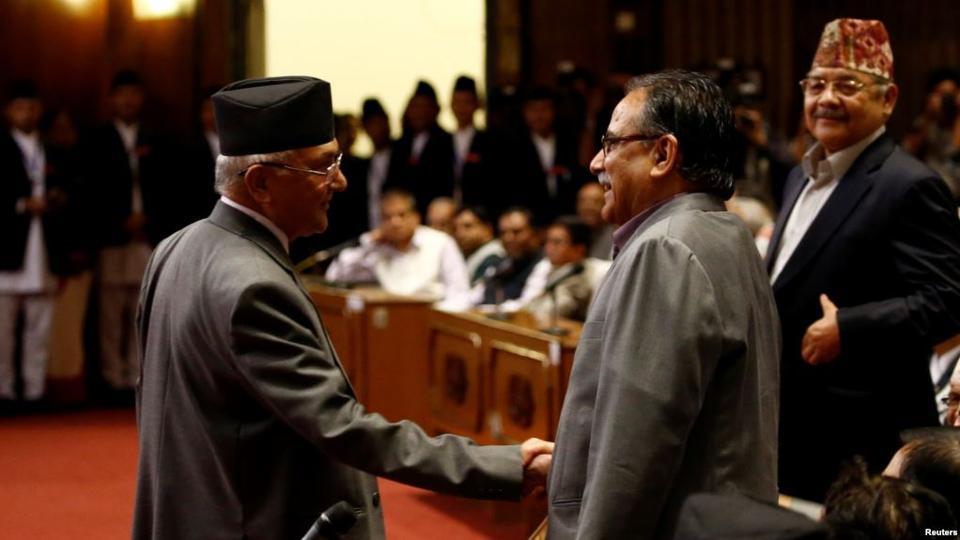Kathmandu : During the presidential election, the leaders of the Nepal Communist Party (UML) who were betrayed commented that Prime Minister Pushpa Kamal Dahal ‘Prachanda’ had only aimed for the vice presidency election. After the president was elected, the analysis of the UML leaders was that the Nepali Congress would not leave Prachanda at any time. In the informal conversation, the UML leaders currently claim that they are not going towards a “Congress-Maoist” coalition with confidence. During the meeting of the House of Representatives on Monday, the opposition parties speculated about when the new date for the vote of confidence will be announced, as the opposition parties have not taken the vote of confidence in two months. Bishnu Poudel and Rajendra Lingden, who serve as deputy prime ministers in the Prachanda led government, asked whether another incident would happen in April. At a time when the credibility of political parties is at zero, Prachanda was the first to wield the sword on the day he won the confidence of 268 MPs for the first time on Paush 26. For the first time, he managed to keep 172 MPs with him on Chaitra 6. Prachanda himself has clarified that this number is more than 169 on the day of his appointment as prime minister.
The doubt that has arisen has increased the disbelief more than faith, due to the unexpected support on Push 26. After the Congress backed down, Prachanda beat up the UML who wanted to make him prime minister. As a result, the government was formed with limited participation from seven members of the Prachanda cabinet after 62 days of negotiations.
The current alliance is seen as natural, and Prachanda is optimistic about the cooperation between the communists and the Congress lasting a long time. In response to the vote of confidence in the House of Representatives, Prachanda said, “Whatever happened, it’s enough. Now the government will run smoothly. Now the work of development and construction will gain momentum.” Although he expressed the opinion that the government would run smoothly, Prachanda himself is not without doubt, and he expressed it in Parliament.
Another leader, Madhav Nepal, confirmed that the doubt persists, and it is not illegal to express the desire for a third vote of confidence. Despite being used to the ups and downs of politics, Nepal said that the five-year coalition with the Maoists will not continue after the Congress cooperation with Prachanda collapses.
However, it is possible to understand from his statements that there is still doubt remaining in Prachanda regarding the cooperation with the Congress. If Prachanda is upset by the fact that his government is running smoothly, then the statement he made to himself, “We will be in the same place after Baisakh,” will be confirmed. On the 26th of Poush (January 10th), the Communist Party of Nepal (MC) was not entirely happy despite securing the trust of 99% of the members of parliament. Although the government was weak and formed on a fragile ground, CPN Maoist managed to gain an unparalleled trust in parliament due to their own interest and lobbying. However, they were unsuccessful in turning that trust into public support.
As in the past, Manmohan Adhikari also secured support similar to that of the Prachanda on the 26th of Poush. In 1994, former Prime Minister Manmohan Adhikari had secured support from 198 out of 205 members of parliament in the then House of Representatives. Especially since Adhikari was the prime minister of a minority government. In the midterm elections conducted during the Nepali Congress’ government with a single majority, the Communist Party of Nepal (UML) won 88 seats. They needed 103 members out of 205 in the then House of Representatives to form a majority. After failing to do so, King Birendra appointed Manmohan as the prime minister under Article 42 (2) of the Constitution of Nepal as a minority government.
In a situation where the Prime Minister did not receive the vote of confidence, there was a risk of the dissolution of the House of Representatives. The Congress supported the government. Manmohan, with the support of 198 MPs, including RPP, started some popular initiatives despite being in a weak position. “Build Your Own Village” program revived the village. He worked to make Nepal a self-reliant nation. However, when he was in the prime minister’s chair, the situation in the country was not stable. There was a shortage of essential goods, and the general public was suffering from poverty.




प्रतिक्रिया